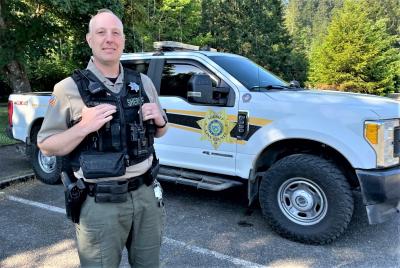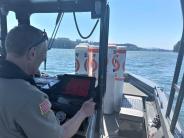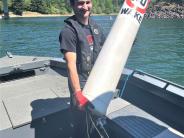Summer boating season is here -- get ready, be safe!
SWEET HOME — Boating season has arrived in the mid-valley and soon, local waterways will be filled with all kinds of watercraft — from kayaks and paddleboards to fishing boats to high-speed ski boats.
Linn County Marine Patrol Deputy Dan Graybill reminds everyone they can enjoy the area’s plentiful water resources, if we all follow some simple boating courtesy guidelines.
And, Graybill emphasizes, that means being prepared well before you pull up to one of the many boat ramps on our reservoirs and rivers.
“Number one, make sure your boat maintenance is done before you launch at a ramp,” Graybill said.
Tempers can get short on a busy weekend day, when someone ties up valuable dock space trying to get their boat to run properly.
All items needed for your outing should be in the boat and operational.
Long before you launch your boat, make sure the engine has been tuned up and runs properly, that the carburetor’s spark arrestor is clean of debris and oil or gas and there plenty of personal flotation devices and they fit accordingly for every person who will be in the boat.
It makes no sense having an extra-large life jacket for a 2-year-old passenger and vice versa.
Also, make sure the drain plug is in and that your boat’s bilge pump and engine exhaust fans are operational.
Have the boat tie-down straps off or ready to be take off easily and of course, make sure you have adequate working fire extinguishers on hand — check their expiration dates at home not at the ramp.
Graybill says anyone who can’t afford a life jacket for children, should call him at the Linn County Sheriff’s Office 541-967-3950.
“The courtesy docks are for people getting on and off boats,” Graybill said. “Please let passengers off on the dock and then move your boat out into the water to wait for your trailer to arrive. It will great decrease congestion at the ramp area.”
Graybill, who has been a Marine Deputy six years, reminds boat operators they can have alcohol in their watercraft, but just like driving an automobile, the operator cannot be intoxicated.
And just like with automobiles, put down your cell phone when operating a watercraft.
And, he adds, with boat ramp access at Green Peter Reservoir expected to be lost by mid-July, the number of boats on Foster Reservoir could be high so operators will need to be especially careful and have heightened awareness of others around them.
He said that river flows are expected to be higher, faster and colder than usual, so extra caution is advised there as well.
Graybill says he has the best job in Linn County.
He said everyone can enjoy the mid-valley’s beautiful water sources, especially if they are “nice to each other.”
To learn more, visit the Oregon State Marine Board website at: https://www.oregon.gov/osmb/pages/index.aspx.
Boating preparedness — Oregon State Marine Board
- Wearable Life Jackets
Sailboats less than 16 feet in length and all paddle craft (canoes, kayaks, stand up paddleboards, etc.) need to carry properly-fitting, U.S. Coast Guard -approved wearable life jacket(s) for each person on board and the life jacket must be readily accessible. All children 12 and younger are required to wear a life jacket.
Sailboats 16 feet and over must also carry one, Type IV throwable cushion.
- 2. Sound Devices
A boat less than 39 feet 4 inches (or 12 meters) long, must carry a whistle or a compressed air horn. It's easy to attach a whistle to a life jacket. Both are required equipment.
- 3. Navigation Lights
Required only when underway or at anchor between sunset and sunrise, and during periods of restricted visibility.
- 4. Waterway Access Permit (boats 10' and longer, including sail between 10'-11'9")
A waterway access permit is required on boats 10' long and longer, and sailboats between 10' and 11'. One permit per boat. Permits are transferrable to other non-motorized boats and children 13 and younger are exempt.
- 3. Check the weather beforehand
Warm, sunny days are ideal for boating, but you can’t always predict when a storm will roll in. Varying gusts of wind and choppy water are signs of an approaching storm. And even if it’s a warm spring day, the water could instead reflect winter temperatures. In the event that your boat capsizes or you and your passengers get wet, make sure you have a plan to seek help and get dry.
- 4. Don’t overload the boat with people or equipment
Always follow your boat’s capacity restriction. Overloading your boat with passengers or equipment can unbalance your craft.
- 5. Check for harmful fumes
After refueling your boat, open all the hatches and smell for fumes. If detected, don’t start the engine.
Media contact: Alex Paul, Linn County Communication’s Officer, 541-967-3825 or email apaul@co.linn.or.us.



